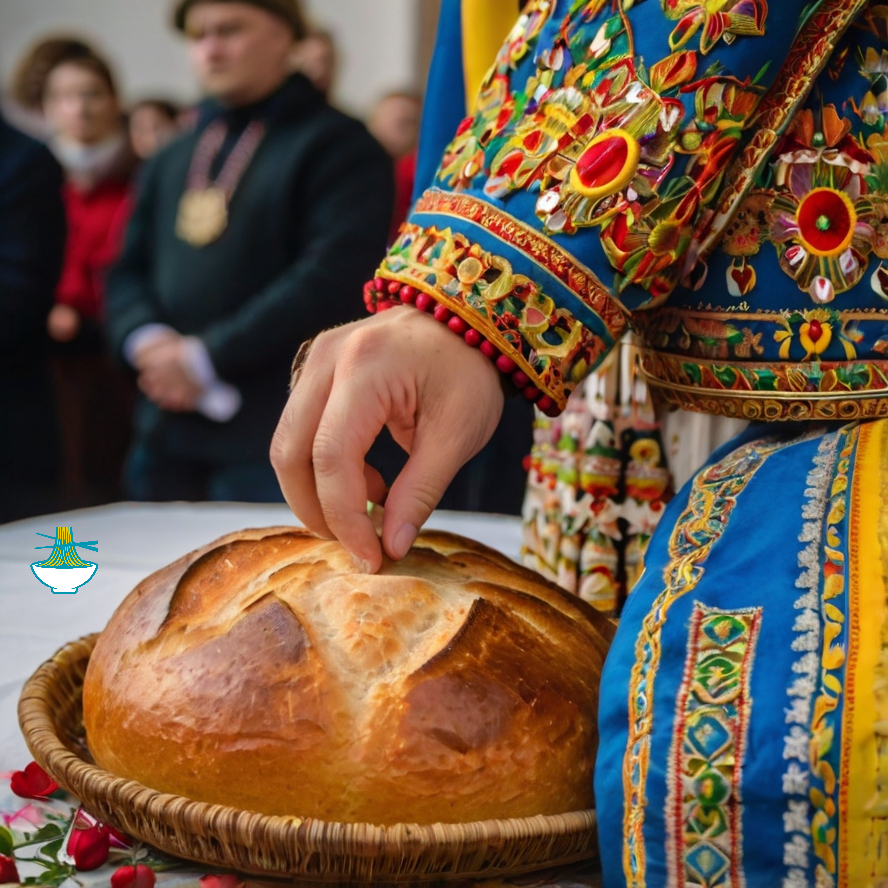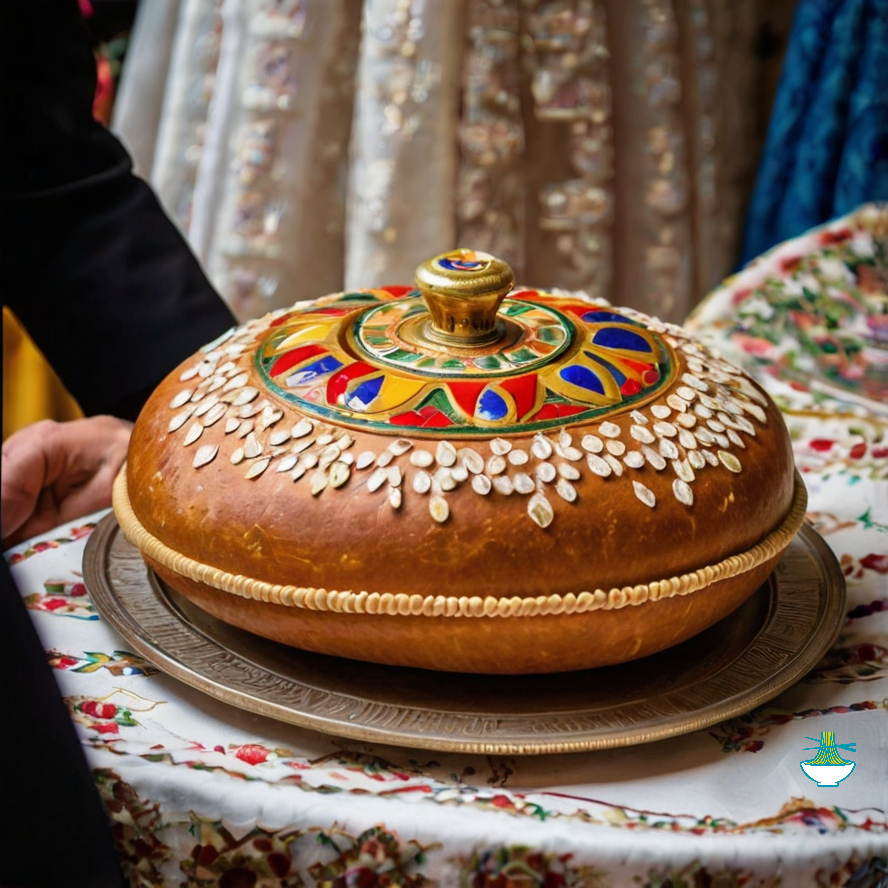Korovai, a revered symbol in Ukrainian weddings, is more than just bread—it's a cherished tradition steeped in history. This ceremonial bread, typically made from wheat flour and yeast, holds deep cultural significance. Its elaborate decoration signifies unity, prosperity, and the bonds of marriage. The recipe often includes intricate braiding, symbols of fertility, and embellishments representing the couple's future together. Dating back centuries, korovai has been a centerpiece of Ukrainian wedding celebrations, embodying the rich heritage and communal spirit of the culture.
Ingredients:
- 4 cups all-purpose flour
- 1 cup warm milk
- 2 teaspoons active dry yeast
- 1/4 cup sugar
- 1/4 cup vegetable oil
- 2 eggs
- 1 teaspoon salt
Decoration (optional):
- Braided dough pieces
- Wheat stalks
- Symbols of fertility (e.g., birds, rings)
Method:
1. Dissolve yeast and sugar in warm milk and let it sit for 5-10 minutes until frothy.
2. In a large bowl, mix flour and salt. Make a well in the center and add yeast mixture, oil, and eggs.
3. Stir until the dough comes together, then knead on a floured surface for 8-10 minutes until smooth and elastic.
4. Place the dough in a greased bowl, cover, and let it rise in a warm place for 1-2 hours, or until doubled in size.
5. Punch down the dough and divide it into pieces for braiding. Shape the dough into a round loaf, leaving a small indentation in the center for decorations.
6. Decorate the korovai with braided dough pieces, wheat stalks, and other symbols as desired.
7. Let the decorated korovai rise for another 30-60 minutes.
8. Preheat the oven to 350°F (175°C). Bake the korovai for 30-40 minutes, or until golden brown and sounds hollow when tapped on the bottom.
9. Let it cool completely before serving as a centerpiece at the wedding celebration.
Nutrition Value:
1. All-purpose flour (4 cups):
- Calories: Approximately 480 kcal
- Carbohydrates: Approximately 96 grams
- Protein: Approximately 12 grams
- Fat: Approximately 1.6 grams
- Sodium: Approximately 4 milligrams
- Cholesterol: 0 milligrams
- Vitamins and minerals: Contains small amounts of iron, calcium, and B vitamins
- Nutritional benefit: Flour provides carbohydrates for energy and some protein for muscle repair and growth. It also contains small amounts of iron and B vitamins, which are important for overall health and energy metabolism.
2. Warm milk (1 cup):
- Calories: Approximately 150 kcal
- Carbohydrates: Approximately 12 grams
- Protein: Approximately 8 grams
- Fat: Approximately 8 grams
- Sodium: Approximately 100 milligrams
- Cholesterol: Approximately 24 milligrams
- Vitamins and minerals: Good source of calcium and vitamin D
- Nutritional benefit: Milk provides protein for muscle building and repair, calcium for bone health, and vitamin D for calcium absorption and immune function.
3. Active dry yeast (2 teaspoons):
- Calories: Approximately 15 kcal
- Carbohydrates: Approximately 3 grams
- Protein: Approximately 2 grams
- Fat: Approximately 0 grams
- Sodium: Approximately 5 milligrams
- Cholesterol: 0 milligrams
- Vitamins and minerals: Contains small amounts of B vitamins and minerals like selenium and zinc
- Nutritional benefit: Yeast is a source of protein and B vitamins, particularly B vitamins like thiamine (B1) and riboflavin (B2), which are important for energy metabolism.
4. Sugar (1/4 cup):
- Calories: Approximately 200 kcal
- Carbohydrates: Approximately 50 grams
- Protein: 0 grams
- Fat: 0 grams
- Sodium: Approximately 0 milligrams
- Cholesterol: 0 milligrams
- Vitamins and minerals: None
- Nutritional benefit: Sugar provides quick energy due to its high carbohydrate content, but it lacks significant vitamins, minerals, or other nutrients.
5. Vegetable oil (1/4 cup):
- Calories: Approximately 480 kcal
- Carbohydrates: 0 grams
- Protein: 0 grams
- Fat: Approximately 56 grams
- Sodium: Approximately 0 milligrams
- Cholesterol: 0 milligrams
- Vitamins and minerals: Contains vitamin E and small amounts of vitamin K
- Nutritional benefit: Vegetable oil provides fat, which is a concentrated source of energy and essential fatty acids. Vitamin E in vegetable oil acts as an antioxidant, protecting cells from damage.
6. Eggs (2):
- Calories: Approximately 140 kcal
- Carbohydrates: Approximately 1 gram
- Protein: Approximately 12 grams
- Fat: Approximately 10 grams
- Sodium: Approximately 140 milligrams
- Cholesterol: Approximately 370 milligrams
- Vitamins and minerals: Excellent source of vitamin B12, vitamin D, and choline. Also contain iron, zinc, and selenium.
- Nutritional benefit: Eggs are a high-quality protein source and provide essential nutrients like vitamin B12 for nerve function, choline for brain health, and vitamin D for bone health.
7. Salt (1 teaspoon):
- Calories: 0 kcal
- Carbohydrates: 0 grams
- Protein: 0 grams
- Fat: 0 grams
- Sodium: Approximately 2,300 milligrams
- Cholesterol: 0 milligrams
- Vitamins and minerals: Contains sodium
- Nutritional benefit: Salt adds flavor to food and is necessary for maintaining fluid balance and nerve function in the body, but should be consumed in moderation to avoid excessive sodium intake.
Decoration (optional):
1. Braided dough pieces:
- Nutritional information: The nutritional content of braided dough pieces would be similar to the main dough used for the korovai, as it's essentially the same mixture but shaped differently.
- Benefits: Provides additional texture and visual appeal to the korovai. The dough, like the main korovai, offers carbohydrates for energy and a small amount of protein.
2. Wheat stalks:
- Nutritional information: Wheat stalks themselves are not typically consumed and do not contribute significantly to the nutritional content of the korovai.
- Benefits: Symbolically, wheat stalks represent prosperity, abundance, and the cycle of life in Ukrainian culture. While not a source of nutrition, they add traditional significance and aesthetic beauty to the korovai.
3. Symbols of fertility (e.g., birds, rings):
- Nutritional information: These decorative symbols do not contribute to the nutritional content of the korovai.
- Benefits: These symbols hold cultural and symbolic significance within the context of Ukrainian weddings. Birds, rings, and other fertility symbols represent wishes for a fruitful and harmonious marriage. Their presence enhances the ceremonial aspect of the korovai, adding depth to its symbolism beyond mere sustenance.


Comments